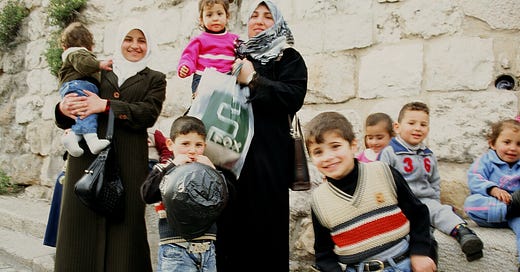On the Responsibilities of the Aid Donor
Adapted from a speech delivered at a Cambridge fundraiser for Medical Aid for Palestinians, February 8th 2024
As you may know, as of today we are entering the fifth month of war in Gaza. Gaza is home to 2.3 million Palestinians, 75% of them refugees from earlier wars.
Over 4 months, nearly 28,000 Palestinians have been killed. 12,000 are children. Over 70% of homes have been destroyed and over 85% of people displaced. 93% of them don’t eat every day and a quarter are starving.
1 million people - half of Gaza’s population - are now trapped in Rafah, the southernmost city on the border with Egypt. They are mostly sleeping in rain-soaked tents or crowded hospital floors, in chicken sheds or on the streets. A military advance on Rafah is about to start and they have nowhere to run.
Just under 1 million others are displaced elsewhere in the south, like in Khan Younis.
There are about 400,000 people left in north Gaza who are quite literally on the brink of famine because aid can’t reach them and they can’t leave their houses.
These numbers may mean little to you. They may signify yet another conflict zone in the Middle East fallen into some catastrophe. They may be as meaningful to you as stock market figures or interest rate hikes. But there are stories behind them.
These are the stories of children eating grass or digging through rabbit feed to try and make bread because there’s no flour. Of children waking up at 6 am and queuing hours to refill their water, or removing pieces of dead children’s brains from water because they can’t afford to waste it. I see people crawling along the floor to find water to avoid being shot. I see people who went out to look for water only for their body to be found in an alley, half-eaten by stray animals. I see the cats poking at the bullet holes.
I see doctors in the hospitals turning to the next patient and realising it’s their own child. I see ashen-faced children having their legs cut off with no anaesthetic – just the bloody stump at the knee and the skin flapping around. I see mothers rifling through charred limbs to find their son’s elbow, just to hold onto him, or trying to put their infant’s head back together while he’s still alive. I see grown men bursting into tears when they find a bag of flour.
To use the terms ‘crisis’ or ‘tragedy’ is to absolve ourselves of responsibility
I don’t want to tell you stories like this of my people, of this suffering, because this is not how we live. We are so much more than this. This is not normal, and yet it has been their normal for four months. Four months. This is not a life.
And yet to use the terms ‘crisis’ or ‘tragedy’ is to absolve ourselves of responsibility. Palestinians are not starving because there is a drought of water or a failure of crops, but because there is a drought of compassion and a failure of humanity. They are not soaked and shivering because of the flood of oceans or the freezing of temperatures, but because of a flood of apathy and the freezing of moral courage.
Helping means not just sending cash but starting conversations
By recognising this, we insert our agency into the equation. We recognise that helping means not just sending cash but starting conversations. It means loving those we do not know and listening to those we do not understand. It means reading names that do not sound like ours and grieving lives that do not look like ours.
I understand we live in different realities. What you may call a ‘militant hotspot,’ I call Palestine, part of my homeland. What I may call a ‘hotbed of political extremism’, you may call the United States of America. Everyone has different names for things.
There is a link below to donate to Medical Aid for Palestine. I hope that by donating to these places, you learn about what you are donating to restore. Theatre and surfing and skateboards and fishing; football and poetry and beaches and universities. These things do not stop in war; in fact, that is when they become more crucial than ever. No one deserves them more or less than anyone else.
The UNRWA predicts Gaza’s economy won’t be restored to its 2022 level until 2092. If you are my age (granted, my liver isn’t exceptionally strong but here's hoping), you will be around 90 years old by then. I would like to see my homeland before then. But I can’t do it without your help.




